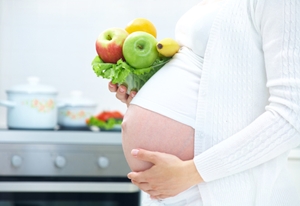Becoming a mother is one of the most amazing experiences a woman can go through, and part of what makes it so amazing is that the woman has to give so much of herself over to the process of gestation and eventually birth and child rearing. Selfishness goes out the window and getting ready for baby and making sure the kid is healthy and happy becomes priority. To ensure that you give birth to as healthy a baby as possible, it's important to feed yourself right and ensure that your child is getting proper nourishment long before he or she emerges from your womb.
Pre-pregnancy cuisine
There's not much you can do in the way of a pre-pregancy diet if the little one is a happy surprise, but if you've made a conscious decision to get pregnant, there are ways to ensure that your body will be ready when the fetus starts growing. Also, some foods can increase your chances of getting pregnant, which is great news if you've been having trouble conceiving. It's important to note that a pregnancy diet is not a diet in the traditional sense of the word. The point here is not to achieve a thigh gap and a flat stomach, it's to get healthy enough to carry a child. Dieting to lose weight during pregnancy can cause health issues for you and your unborn child. Popular fad diets such as The Zone, Raw Food Diet and Atkins will deprive you and your baby of vital nutrients like folic acid and iron.
Foods to avoid during pregnancy for women who are having trouble conceiving include those that are high in trans fats. Trans fats have been linked to the development of endometriosis, which is one of the most common causes of infertility among women. Stay away from fried foods, margarine and certain types of chips and crackers. There are good fats that you'll want to load up on and you can find them in foods like tuna and salmon.
Chow down now that you're pregnant
A pregnancy diet should have you increasing your calorie intake by about 300 calories per day. Think back to your days in high school health class when you were presented with the pyramid representing all the food groups. Somewhere along the way, you may have drastically cut the category that's high in carbohydrates, but now it's time to change that, along with any other less than stellar eating habits you've developed along the way. Breads and grains, fruits and vegetables, protein and dairy all need to make frequent appearances on your plate while you're pregnant.
Fruits and vegetables are loaded with nutrients that your baby will need to grow such as vitamin C and folic acid. It's recommended that pregnant women consume at least 70 mg of vitamin C everyday. Some awesome sources of vitamin C include oranges, grapefruits, broccoli, tomatoes and brussels sprouts. When it comes to folic acid pregnant women need to be getting a minimum of 0.4 mg daily. Folic acid is abundant in dark green leafy vegetables such as kale and spinach, as well as legumes like lima beans and black-eyed peas. Getting your daily dose of folic acid will help prevent neural tube defects, which are birth defects of the brain, spine and spinal cord.
Put some meat on your baby
Protein is key to your baby's development especially in the second and third trimesters. It provides you and your growing baby with iron and vitamin B. Iron is especially important for the life growing inside of you because it helps carry oxygen to the fetus, and to your muscles which can help you avoid fatigue, irritability and depression. Try to get at least 27 mg of protein everyday from meats such as lean beef, lamb, veal and liver. Fish is an excellent source of protein as well, but consult your doctor about what species you'll want to avoid, and some are high in mercury.
Calcium is also very important for maintaining a healthy pregnancy, contributing to strong teeth and bones, normal blood clotting and muscle and nerve function. It's recommended that pregnant women get at least 1,000 mg of calcium everyday. Milk, cheese, yogurt and pudding are delicious sources of calcium. You can also find it in certain kinds of vegetables and seafood.
